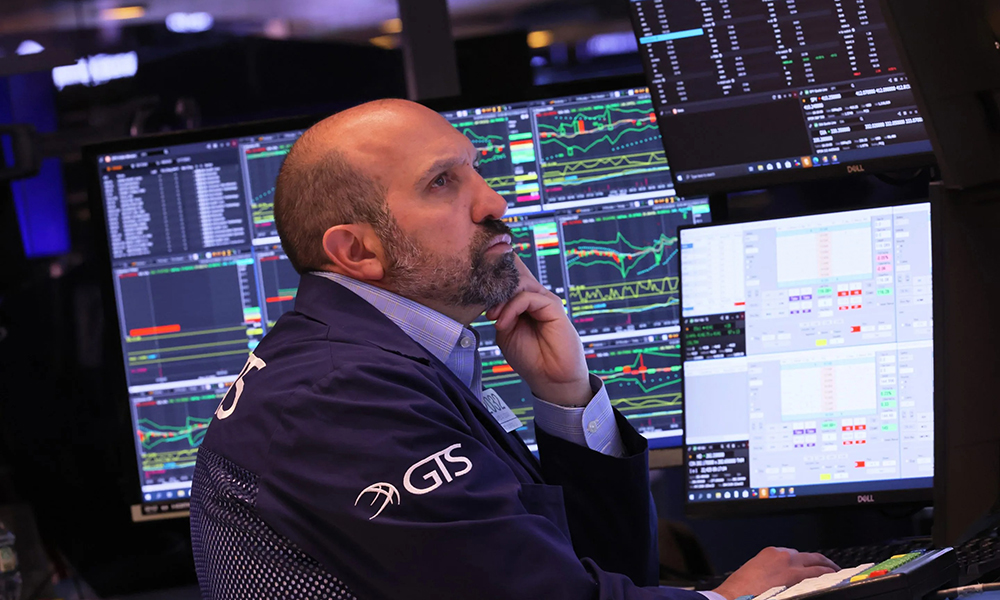
许多经济学家和消费者担心人工智能技术可能会影响到未来的就业。但高盛集团(Goldman Sachs)认为,随着生产率的提高,人工智能革命将使企业利润达到创纪录的水平。
这家投行的高级策略师本·斯奈德于5月18日对美国消费者新闻与商业频道(CNBC)表示:“在未来十年里,人工智能技术每年可以将生产率提高1.5%,单此一项可能使标准普尔500指数(S&P 500)之成分股公司的利润增加至少30%。”
斯奈德指出,显而易见,最近人工智能技术热潮的赢家目前都集中在科技领域,OpenAI的ChatGPT和谷歌(Google)的Bard等聊天机器人爆火,占据新闻头条。但“对投资者来说,真正的问题是谁将成为未来的赢家。”
斯奈德说:“在1999年或2000年科技泡沫期间,很难想象Facebook或Uber会改变我们的生活方式。”他指出,人工智能技术将彻底改变许多行业的面貌,甚至为科技行业之外的投资者提供机会。
在5月17日的一份研究报告里,斯奈德进一步详述了他日益看好人工智能在企业中的应用,称人工智能是“利润率的最大长期潜在支撑”。
斯奈德表示,自1990年以来,标准普尔500指数的成分股公司的利润率已经从5%上升到12%,该指数的每个主要板块都经历了大幅上涨。高盛集团的数据显示,单是利润率的增长就使同期股价上涨超过40%。
高盛集团的模型显示,未来10年,随着生产率的飙升,人工智能技术将使企业利润率再提高四个百分点。现在有越来越多的证据支持这一观点。
麻省理工学院(MIT)的经济学家沙克·诺伊和惠特尼·张在今年3月的一篇工作论文中提出,ChatGPT“大幅提高了专业作家的平均工作效率”,使他们完成多项任务花费的时间减少到平时的一半。弗吉尼亚大学(University of Virginia)的经济学教授安东·科里内克在一项对25个用例的研究中发现,大型语言模型能够“显著”提高经济学家的工作效率。该研究出自美国国家经济研究局(National Bureau of Economic Research)今年2月的一篇工作论文。
然而,斯奈德也指出:“人工智能对经济的最终影响以及针对人工智能可能出台的监管应对措施存在高度不确定性。”
高盛集团的经济学家在今年3月的一份报告里警告称,未来10年,全球预计将有3亿个工作岗位被人工智能取代。但这项技术也可能创造新的就业岗位,为企业降低成本,并且如前所述,提高企业生产率,这使得认识其未来影响变得困难。
在5月16日美国参议院司法委员会(Senate Judiciary Committee)举行的听证会上,就连OpenAI的联合创始人萨姆·奥尔特曼也承认,这项技术的潜在影响尚不确定,他呼吁政府加大监管力度。
奥尔特曼告诉美国国会:“我最担心的是,我们这个领域、这项技术、这个行业会对世界造成重大伤害。我认为,如果这项技术出了问题,可能就会引发严重后果。”(财富中文网)
译者:刘进龙
审核:汪皓
许多经济学家和消费者担心人工智能技术可能会影响到未来的就业。但高盛集团(Goldman Sachs)认为,随着生产率的提高,人工智能革命将使企业利润达到创纪录的水平。
这家投行的高级策略师本·斯奈德于5月18日对美国消费者新闻与商业频道(CNBC)表示:“在未来十年里,人工智能技术每年可以将生产率提高1.5%,单此一项可能使标准普尔500指数(S&P 500)之成分股公司的利润增加至少30%。”
斯奈德指出,显而易见,最近人工智能技术热潮的赢家目前都集中在科技领域,OpenAI的ChatGPT和谷歌(Google)的Bard等聊天机器人爆火,占据新闻头条。但“对投资者来说,真正的问题是谁将成为未来的赢家。”
斯奈德说:“在1999年或2000年科技泡沫期间,很难想象Facebook或Uber会改变我们的生活方式。”他指出,人工智能技术将彻底改变许多行业的面貌,甚至为科技行业之外的投资者提供机会。
在5月17日的一份研究报告里,斯奈德进一步详述了他日益看好人工智能在企业中的应用,称人工智能是“利润率的最大长期潜在支撑”。
斯奈德表示,自1990年以来,标准普尔500指数的成分股公司的利润率已经从5%上升到12%,该指数的每个主要板块都经历了大幅上涨。高盛集团的数据显示,单是利润率的增长就使同期股价上涨超过40%。
高盛集团的模型显示,未来10年,随着生产率的飙升,人工智能技术将使企业利润率再提高四个百分点。现在有越来越多的证据支持这一观点。
麻省理工学院(MIT)的经济学家沙克·诺伊和惠特尼·张在今年3月的一篇工作论文中提出,ChatGPT“大幅提高了专业作家的平均工作效率”,使他们完成多项任务花费的时间减少到平时的一半。弗吉尼亚大学(University of Virginia)的经济学教授安东·科里内克在一项对25个用例的研究中发现,大型语言模型能够“显著”提高经济学家的工作效率。该研究出自美国国家经济研究局(National Bureau of Economic Research)今年2月的一篇工作论文。
然而,斯奈德也指出:“人工智能对经济的最终影响以及针对人工智能可能出台的监管应对措施存在高度不确定性。”
高盛集团的经济学家在今年3月的一份报告里警告称,未来10年,全球预计将有3亿个工作岗位被人工智能取代。但这项技术也可能创造新的就业岗位,为企业降低成本,并且如前所述,提高企业生产率,这使得认识其未来影响变得困难。
在5月16日美国参议院司法委员会(Senate Judiciary Committee)举行的听证会上,就连OpenAI的联合创始人萨姆·奥尔特曼也承认,这项技术的潜在影响尚不确定,他呼吁政府加大监管力度。
奥尔特曼告诉美国国会:“我最担心的是,我们这个领域、这项技术、这个行业会对世界造成重大伤害。我认为,如果这项技术出了问题,可能就会引发严重后果。”(财富中文网)
译者:刘进龙
审核:汪皓
Many economists and consumers are worried about the impact artificial intelligence (A.I.) technology could have on employment moving forward. But for corporations, the A.I. revolution is set to bring in record profits as productivity booms, according to Goldman Sachs.
“Over the next 10 years, A.I. could increase productivity by 1.5% per year. And that could increase S&P 500 profits by 30% or more,” Ben Snider, a senior strategist at the investment bank, told CNBC on May 18.
Snider noted that the clear winners of the recent A.I. tech boom, headlined by the surging popularity of chatbots like OpenAI’s ChatGPT and Google’s Bard, are in the tech sector for now, but “the real question for investors is who are going to be winners down the road.”
“In 1999 or 2000, during the tech bubble, it would be very hard to envision Facebook or Uber changing the way we live our lives,” he said, noting that A.I. technology is set to forever change many industries and also offers opportunity for investors even outside of the tech sector.
In a Wednesday research note, Snider further detailed his increasing optimism for A.I. in the corporate world, calling it the “biggest potential long-term support for profit margins.”
The senior strategist noted that since 1990, S&P 500 profit margins have risen from 5% to 12%, with every major sector in the index experiencing a jump. This margin expansion alone accounted for more than 40% of stocks’ gains over that period, according to Goldman’s data.
Over the next decade, the investment bank’s models indicate that A.I. tech will help lift corporate profit margins by another 4 percentage points as productivity soars. And there’s growing evidence to back up their claim.
MIT economists Shakked Noy and Whitney Zhang found in a March working paper that ChatGPT “substantially raises average productivity” for professional writers, enabling them to complete many tasks in half the normal time. And University of Virginia economics professor Anton Korinek found that large language models can increase economists’ productivity “significantly” in a study of 25 use cases published in a February National Bureau of Economic Research working paper.
However, Snider also noted that “uncertainty around both the eventual economic impact of AI and the regulatory response it may elicit is high.”
In a March report, Goldman’s economists warned that A.I. tech could replace 300 million jobs globally over the next 10 years. But the tech is also likely to create new jobs, cust costs for corporations, and, as previously mentioned, boost productivity, which makes discerning its future impact complicated.
Even OpenAI co-founder Sam Altman admitted in testimony before the Senate Judiciary Committee on May 16 that potential impact of the technology is uncertain, as he called for increased regulation.
“My worst fear is that we—the field, the technology, the industry—cause significant harm to the world,” Altman told Congress. “I think if this technology goes wrong, it can go quite wrong.”






